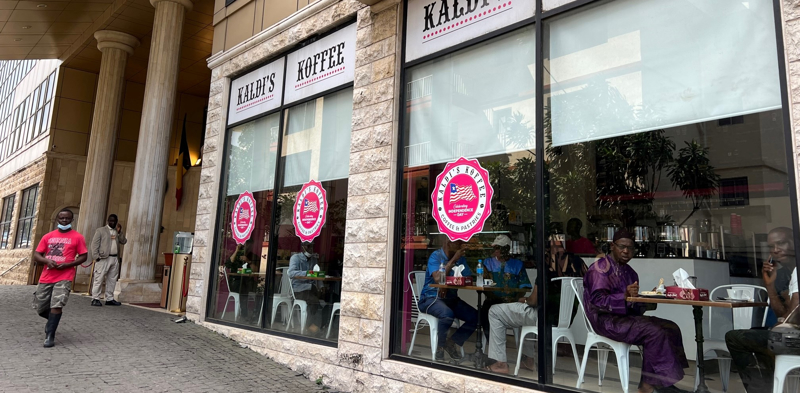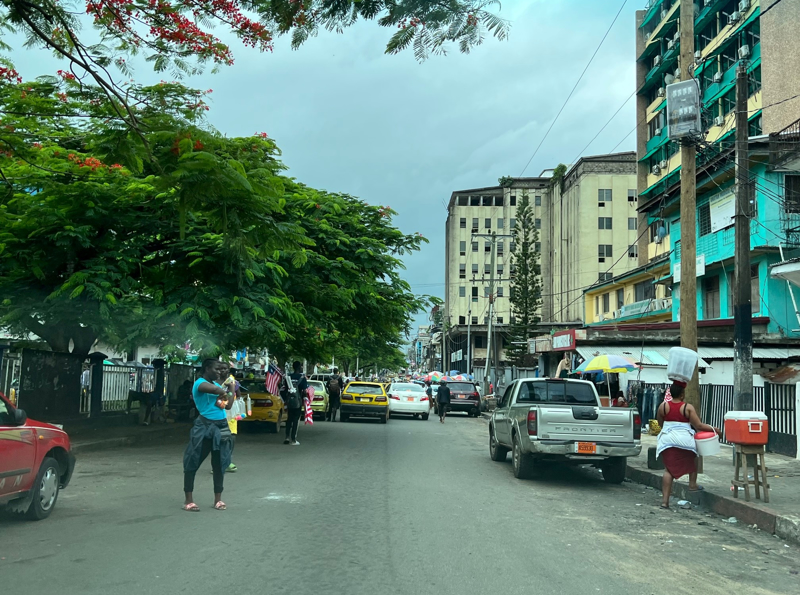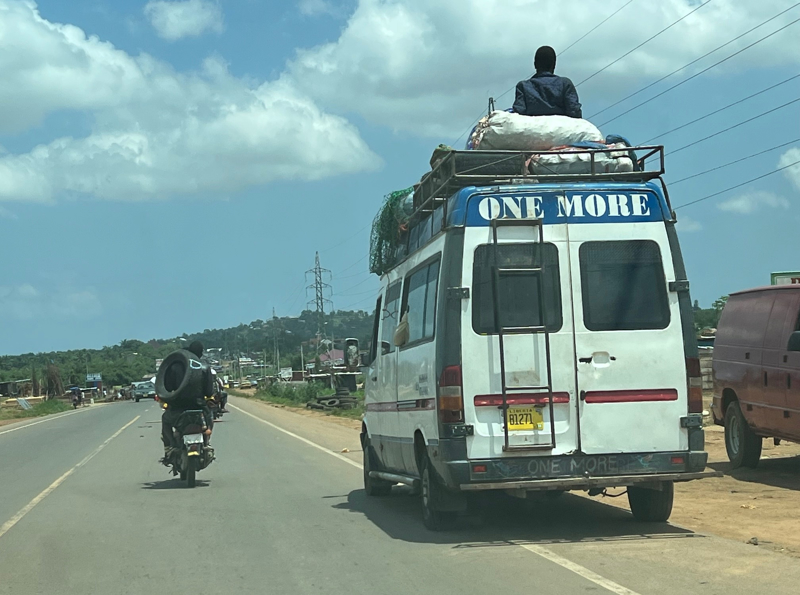Africa 2022
Hitting the ground “running” is easier stated than this country permits in practice.
Jay and I hit the road at 9:00, quite early in our books considering the long travel days preceding. We are ambitiously setting out for the main Cuttington University campus, in the center of the nation, three hours north under the best of conditions.
But five turns and a quarter-mile later, truth trumps our wishes now dashed; we are crawling through Saturday, everyone’s going-to-market traffic made even more uber-impossible in this four-day holiday weekend for “July 26,” Liberian Independence Day, this coming Tuesday. Incessant honking, the music of this narrow street, four wheelers, put-puts, and bikes, both directions, in each-others’ grip, with the “boys,” aka the everywhere young men, en masse sitting, standing hip-to-hip, shoulder-to-shoulder along the sides just waiting, it seems, for something to happen. Windows up, iPhones down.
We are through that first jam, 100 yards long, in 20 minutes flat. Hey, maybe that was just an aberration. Cuttington still beckons, northward.
Was it Einstein that observed repeating the same action and expecting a different result is the definition of stupidity? Or was that his take on insanity? Or was it somebody else who first announced such wisdom? Whatever. It still holds true to this day, unfortunately.
Accordingly, 15 minutes later we arrive at the main vein north, its travelers petrified. This is simply “Coca Cola,” stretch known by the bottling plant prominently featured. As with the Star Beer factory on the way out of town west, this facility was by Grace impervious to the war’s rockets (1989-2003), all sides respecting the premises as sacred.
Well, we may be insane but we are not crazy. Later for Cuttington. Jay hangs left back toward “Red Light” market and the city but even this bright idea promptly dims, just too f’in jammed that way too. We again retreat with a u-turn. Multiple more hair’s widths escapes and an hour later, sanctuary: Kaldi’s Koffee on Monrovia’s Tubman Blvd. main drag.
All for the better. On this morning no. one, we can chill and acclimate over espresso and behind glass. Kaldi’s is part of the Royal Hotel, national convergence point. My first stay here was 2007, in the old four-story building, no elevator, with its Star Wars-conjured saloon in the back, filled with multi-national peacekeeping forces, local
Tim Bowles
7 chapters
25 Jul 2022
Day Two - Freedom Ground
July 23, 2022
|
Monrovia and Paynesville, Liberia
Hitting the ground “running” is easier stated than this country permits in practice.
Jay and I hit the road at 9:00, quite early in our books considering the long travel days preceding. We are ambitiously setting out for the main Cuttington University campus, in the center of the nation, three hours north under the best of conditions.
But five turns and a quarter-mile later, truth trumps our wishes now dashed; we are crawling through Saturday, everyone’s going-to-market traffic made even more uber-impossible in this four-day holiday weekend for “July 26,” Liberian Independence Day, this coming Tuesday. Incessant honking, the music of this narrow street, four wheelers, put-puts, and bikes, both directions, in each-others’ grip, with the “boys,” aka the everywhere young men, en masse sitting, standing hip-to-hip, shoulder-to-shoulder along the sides just waiting, it seems, for something to happen. Windows up, iPhones down.
We are through that first jam, 100 yards long, in 20 minutes flat. Hey, maybe that was just an aberration. Cuttington still beckons, northward.
Was it Einstein that observed repeating the same action and expecting a different result is the definition of stupidity? Or was that his take on insanity? Or was it somebody else who first announced such wisdom? Whatever. It still holds true to this day, unfortunately.
Accordingly, 15 minutes later we arrive at the main vein north, its travelers petrified. This is simply “Coca Cola,” stretch known by the bottling plant prominently featured. As with the Star Beer factory on the way out of town west, this facility was by Grace impervious to the war’s rockets (1989-2003), all sides respecting the premises as sacred.
Well, we may be insane but we are not crazy. Later for Cuttington. Jay hangs left back toward “Red Light” market and the city but even this bright idea promptly dims, just too f’in jammed that way too. We again retreat with a u-turn. Multiple more hair’s widths escapes and an hour later, sanctuary: Kaldi’s Koffee on Monrovia’s Tubman Blvd. main drag.
All for the better. On this morning no. one, we can chill and acclimate over espresso and behind glass. Kaldi’s is part of the Royal Hotel, national convergence point. My first stay here was 2007, in the old four-story building, no elevator, with its Star Wars-conjured saloon in the back, filled with multi-national peacekeeping forces, local

honchos, hunters, hookers, and that gigantic projection of Yankees v. Red Sox over the bar, courtesy South African satellite feed, DSTV (aka Dry Season TeleVision).
The Royal new building rose out of the parking lot, ten-or-so stories at $200-plus nightly, all air conditioned marble, express elevator to the roof restaurant. … and ground floor Kaldi’s, warm apple pie and super-Americano a la Liberia.
And out there is the nation, city-version passing in both directions. Not much changed from 15-years back except for the absence of armored personnel carriers.
We drive the city with no particular aim except to touch base. I know the streets and many buildings by name and incident. The former Gender Ministry, site of our first (2007) human rights campaign

competition; Randall Street (where one can get anything) and the 18s (the gang that controls it); up the hill on Benson, fortress (U.S.) Embassy on left (built over the Greystone refugee killing field) and on right the quiet husks of the Masonic Temple and Ducor Hotel, (in)famous pre-conflict sites of power and privilege.
We hit the Stop & Shoppe on the way back out through Congotown, with its relatively cheap bottled water, $15 corn flakes and most everything else also Western.
Evening, we host Kofi at the RLJ. Samuel Kofi Woods, Jay’s first mentor (after his dad), fellow "counselor" (as lawyer brethren/sistren are known) and veteran of so much that has swept through and over Liberia.
Kofi for instance saw Charles Taylor – warlord, later president elected

(’97) out of popular fear of what he’d do if he lost – for who and what Taylor was, a sociopathic autocratic monster. At a time when Taylor was a darling of many in the West (e.g., Jesse Jackson, Jimmy Carter), Kofi went on record that Mr. President of Liberia was responsible for politically inspired ritual (“juju,” witchcraft) killings. As the story went, “heart men” were circulating the country, removing human hearts to be consumed by candidates to increase their odds of victory. “Letter from Liberia, The Devil They Know,” The New Yorker, July 27, 1998.
Taylor is now serving his remaining years imprisoned as a war criminal. Kofi persevered through the shooting and severing war and continues to survive the peace. His law practice is across the region; he’s driving to Freetown in neighboring Sierra Leone tomorrow, now only seven hours, likely less time than it takes negotiating both air terminals.

His passion is youth drug education, looking for educational materials. How coincidental (although I don’t happen to embrace the notion): Foundation for Drug Free World, https://www.drugfreeworld.org, to which I can introduce him by no more than one degree of separation.
Kofi and Jay, as usual, continue to introduce me to these surroundings. The Gola people (inland northwestern Liberia, southeastern Sierra Leone, traceable to the Congo region) are expanding influence through Islam and taking initiative in education and social provision into the coastal regions. Taylor was/is mixed Gola and Americo.
Wikipedia tells us that “according to Gola oral tradition, other ethnic groups later started to make war with the Gola people … Gola men …

got furious and went into the deep forest where they [enraged the] monster/demon … called ‘Dad?w?’ (DAH-deh-weh). Dadewe has a deep voice but has no mask like the Zogbenya (spirit men who bring justice and order in Gola society) …Dadewe also has furious teeth that marks the backs of its initiates. The Dazonya (high priests) communicated with the spirit that they needed to be properly trained for war. They then brought Dadewe to ‘swallow’ the boys and rebirth them as men … Once Dadewe trained them they were able to fight back and stay on their land.” https://en.wikipedia.org/wiki/Gola_people
We walk Kofi to his car while he recounts a legal challenge to the RLJ facility’s presence on this property. While the land is dedicated to cultural heritage in perpetuity, the Ellen Johnson administration arranged with Robert L. Johnson, BET co-founder, to develop this resort, a commercial operation.
I offer the counter-argument. It remains a cultural center, check out the African masks in the bar.
Liberia lives – or actually thrives – on its ironies. Onward Kofi. See you next time man.
Tim
Paynesville, Liberia
Saturday, July 23, 2022
Share your travel adventures like this!
Create your own travel blog in one step
Share with friends and family to follow your journey
Easy set up, no technical knowledge needed and unlimited storage!